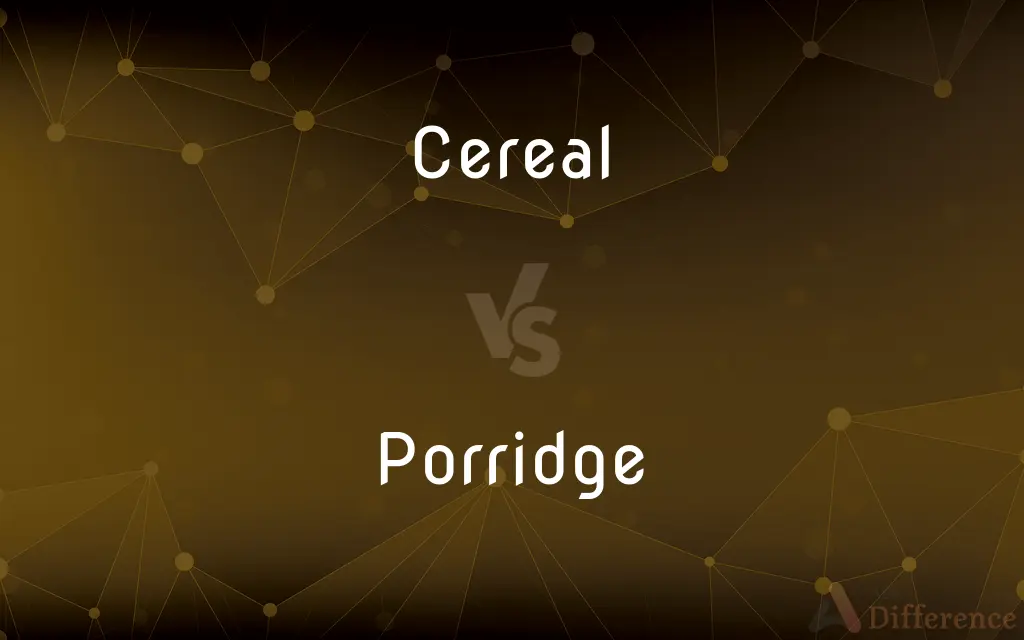Cereal vs. Porridge — What's the Difference?
By Urooj Arif & Fiza Rafique — Updated on April 16, 2024
Cereal typically refers to processed grain products often eaten cold with milk, while porridge is any grain cooked in milk or water until thick.

Difference Between Cereal and Porridge
Table of Contents
ADVERTISEMENT
Key Differences
Cereal is usually made from processed grains such as corn, wheat, or oats, and is often fortified with vitamins and minerals. It is typically consumed cold, served with milk. Porridge, on the other hand, involves grains that are cooked in water or milk until they break down into a thick, creamy consistency. It is usually served hot and can be made from a variety of grains like oats, rice, or corn.
Cereals are commonly found in ready-to-eat forms such as flakes, puffs, or muesli, designed for convenience and quick preparation. Whereas porridge requires cooking, which can take anywhere from a few minutes to half an hour, depending on the grain used.
Nutritionally, cereals can vary widely; some are high in sugar and additives, while others are whole grains that provide fiber and nutrients. Porridge made from whole grains is generally considered a wholesome option, rich in fiber and naturally low in fat.
The flavor of cereal often comes from added sugars, fruits, or nuts. In contrast, porridge might be flavored with natural ingredients like salt, honey, or fresh fruits, which complement the natural taste of the cooked grains.
Cereals are often marketed as children’s food, featuring colorful packaging and sweet flavors. Porridge, however, is frequently seen as a hearty meal that suits all ages, providing a warming and satisfying start to the day.
ADVERTISEMENT
Comparison Chart
Base Ingredient
Processed grains (e.g., corn, wheat, oats)
Whole grains (e.g., oats, rice, corn)
Typical Serving
Cold, with cold milk
Hot, with milk or water
Preparation Time
Quick, often instant
Longer, requires cooking
Nutritional Content
Can be high in sugar and additives
Generally high in fiber, low in fat
Common Flavors
Sugars, artificial flavors, fruits
Natural ingredients like honey, fruits
Compare with Definitions
Cereal
Any grass cultivated for the edible components of its grain.
Barley and millet are both cereals.
Porridge
A versatile dish that can be sweet or savory.
I like my porridge topped with a pinch of salt and butter.
Cereal
A breakfast food made from processed grains.
My favorite breakfast is a bowl of cereal with milk.
Porridge
Often eaten to warm the body in cold weather.
Nothing beats hot porridge on a chilly morning.
Cereal
A grain used for food.
Wheat is a popular cereal crop.
Porridge
A soft food made by boiling a cereal or legume in milk or water.
Oatmeal porridge is a traditional breakfast in many countries.
Cereal
A commercial product during breakfast.
This cereal comes in both frosted and unfrosted varieties.
Porridge
A traditional dish in many cultures.
Rice porridge is a common meal throughout Asia.
Cereal
Food eaten typically at breakfast.
Children often prefer chocolate-flavored cereal.
Porridge
Considered a healthy breakfast option.
Porridge is a great way to start the day with a fiber-rich meal.
Cereal
A cereal is any grass cultivated (grown) for the edible components of its grain (botanically, a type of fruit called a caryopsis), composed of the endosperm, germ, and bran. The term may also refer to the resulting grain itself (specifically "cereal grain").
Porridge
Porridge is a food commonly eaten as a breakfast cereal dish, made by boiling ground, crushed or chopped starchy plants—typically grain—in milk. It is often cooked or served with added flavourings such as sugar, honey, (dried) fruit or syrup to make a sweet cereal, or it can be mixed with spices, meat or vegetables to make a savoury dish.
Cereal
A grass such as wheat, oats, or corn, the starchy grains of which are used as food.
Porridge
A dish consisting of oatmeal or another meal or cereal boiled in water or milk.
Cereal
The grain of such a grass.
Porridge
Time spent in prison
I'm sweating it out doing porridge
Cereal
Any of several other plants or their edible seeds or fruit, such as buckwheat or certain species of amaranth.
Porridge
A soft food made by boiling oatmeal or another meal in water or milk.
Cereal
A food prepared from any of these plants, especially a breakfast food made from commercially processed grain.
Porridge
A dish made of grain or legumes, milk and/or water, heated and stirred until thick and typically eaten for breakfast.
Eat your porridge while it's hot!
Cereal
Consisting of or relating to grain or to a plant producing grain.
Porridge
Oatmeal porridge.
Cereal
(countable) A type of grass (such as wheat, rice or oats) cultivated for its edible grains.
Porridge
Rice porridge; congee.
Cereal
(uncountable) The grains of such a grass.
Porridge
A prison sentence.
Just do your porridge and keep your head down.
Cereal
(uncountable) Breakfast cereal.
Would you like some cereal?
Which cereal would you like for breakfast?
A bowl of cereal
Porridge
(rare) A type of thick soup or stew, especially thickened with barley.
Cereal
Of or pertaining to the grasses which are cultivated for their edible seeds (as wheat, maize, rice, etc.), or to their seeds or grain.
Porridge
A food made by boiling some leguminous or farinaceous substance, or the meal of it, in water or in milk, making of broth or thin pudding; as, barley porridge, milk porridge, bean porridge, etc.
Cereal
Any grass cultivated for its edible grain, or the grain itself; - usually in the plural.
Porridge
Soft food made by boiling oatmeal or other meal or legumes in water or milk until thick
Cereal
Grass whose starchy grains are used as food: wheat; rice; rye; oats; maize; buckwheat; millet
Cereal
Foodstuff prepared from the starchy grains of cereal grasses
Cereal
A breakfast food prepared from grain
Cereal
Made of grain or relating to grain or the plants that produce it;
A cereal beverage
Cereal grasses
Common Curiosities
Can cereal be eaten hot?
Yes, some types of cereal are designed to be eaten hot, though most are typically served cold.
Is porridge better than cereal for a diet?
Porridge, especially when made from whole grains, is often healthier due to its higher fiber content and lower sugar levels.
What types of grains can be used to make porridge?
Almost any grain can be used, including oats, rice, corn, barley, and more.
How is porridge prepared?
Porridge is prepared by boiling grains like oats, rice, or corn in water or milk until they reach a thick, creamy consistency.
Why is porridge considered a comfort food?
Porridge has a warm, creamy texture that can be comforting, especially in cold weather.
How long does it take to make porridge?
Cooking time for porridge varies, typically taking from 5 to 30 minutes based on the grain used.
What is cereal made of?
Cereal is primarily made of processed grains like corn, wheat, or oats, often enhanced with vitamins and sugars.
What makes cereal a popular breakfast choice?
Its convenience and variety of flavors make cereal a popular choice for a quick breakfast.
Does cereal need to be cooked?
Most cereals are pre-cooked during manufacturing and can be eaten without additional cooking.
What are the health benefits of eating porridge?
Porridge is beneficial due to its high fiber content and ability to provide long-lasting energy.
How can I make my cereal healthier?
Choosing cereals that are high in fiber and low in sugar, and adding fruits or nuts can make it healthier.
Are there gluten-free cereal options?
Yes, there are many gluten-free cereals available made from rice, corn, or alternative grains.
Can porridge be flavored differently?
Yes, porridge can be flavored with a variety of toppings like fruits, nuts, honey, or spices.
Can porridge be made with water instead of milk?
Yes, porridge can be made with either water or milk, depending on personal preference.
Is cereal a good snack?
Cereal can be a convenient and tasty snack, though its nutritional value varies by type.
Share Your Discovery

Previous Comparison
Licensing vs. Franchising
Next Comparison
Grout vs. MortarAuthor Spotlight
Written by
Urooj ArifUrooj is a skilled content writer at Ask Difference, known for her exceptional ability to simplify complex topics into engaging and informative content. With a passion for research and a flair for clear, concise writing, she consistently delivers articles that resonate with our diverse audience.
Co-written by
Fiza RafiqueFiza Rafique is a skilled content writer at AskDifference.com, where she meticulously refines and enhances written pieces. Drawing from her vast editorial expertise, Fiza ensures clarity, accuracy, and precision in every article. Passionate about language, she continually seeks to elevate the quality of content for readers worldwide.
















































